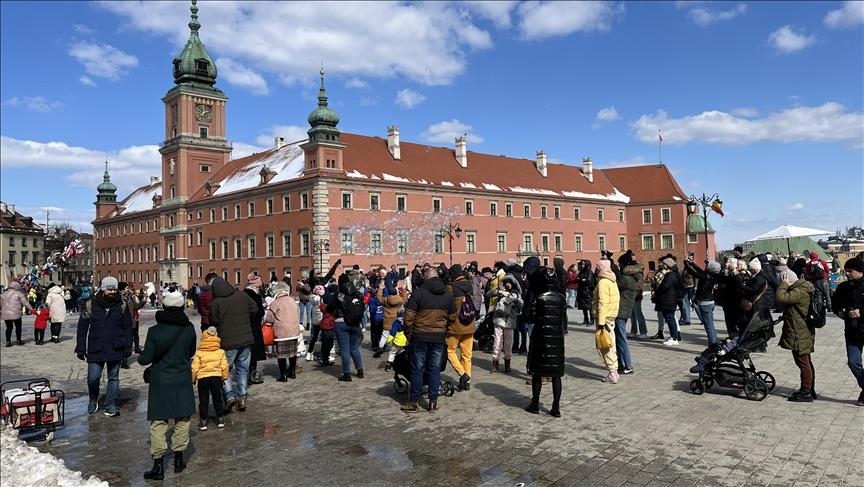Kremlin disinformation campaign targets Polish pacifist groups, analysts say
The anti-war slogan #niemojawojna (not my war) becomes increasingly popular in Poland, analysts think it is supported by Russia

WARSAW
The slogan #niemojawojna (not my war) is becoming increasingly popular in Poland and will intensify before the elections later this year, analysts have said Wednesday.
Journalist Anna Mierzynska told independent radio TOK FM that the slogan is part of a wider campaign and will become more intensive, because the Polish state has not taken "real actions" to prevent it.
“We are defenseless,” Mierzynska said.
The Polish general election will take place later this year, with the ruling Law and Justice (PiS) party holding a narrowing lead in opinion polls.
“From the Kremlin's point of view, these are very important activities. If doubt is sown, there will be fewer people supporting politicians who support Ukraine. We are in the pre-election period and this influence will intensify before the elections. To support anti-Ukrainian politicians. And the Kremlin will support it, among other things. Hundreds or thousands of comments, because it will be just one of the actions taken,” said Mierzynska.
The slogan "niemywojna" has recently been seen on banners at football stadiums, including at Slask Wroclaw.
Underneath this seemingly pacifist message is openly pro-Russian content that blames the Russian invasion of Ukraine on the US, as well as suggestions that Poland intends to send its troops into Ukraine, according to Mierzynska.
Growing Russian influence
Post-Soviet Russia is clearly trying to reclaim its influence in Central and Eastern Europe, reopen historical wounds between nations and in the process weakening the EU, Mierzynska also said.
The messages are endorsed by the Polish Anti-War Movement, led by Leszek Sykulski and Sebastian Piton. The former is an ex-employee of President Lech Kaczynski's office and a colleague of PiS politician Antoni Macierewicz.
Journalist Tomasz Piatek’s book ‘Macierewicz and his Secrets,’ published in 2017, shows how Macierewicz -- then at the heart of the intelligence community -- had connections with the pro-Russian party Change.
The government’s Plenipotentiary for the Security of the Information Space, Stanisław Zaryn, said in February that a disinformation campaign was taking place and described cases of e-mails and leaflets posted in the streets of Polish cities.
He alleged that government offices were collecting information on Ukrainian refugees living in Poland.
“Poland is preparing a database for (…) a future mobilization action, which is supposed to be conducted in Poland,” Zaryn said.
Similar disinformation campaigns are taking place in Ukraine and Lithuania and could be linked to Russia, he added.
“This is clearly a suggestion from the Russian side, which is part of various campaigns calculated to provoke mutual hostility between Ukrainians and the societies in the countries where they currently reside,” he went on to say.
“We estimate, and this is the data, that we are dealing with the preparation of a more serious, large-scale campaign on an international scale. It may involve several Western countries, and we can certainly see that its first stages are already taking place in Poland, hence my warning speech,” he said.
Disinformation
Poland is seen as perhaps the most Russo-sceptic country in Europe. The cornerstone of PiS’s self-legitimation is that the Kremlin was culpable in the 2010 plane crash in Smolensk in western Russia that killed over 100 senior Polish political and military officials.
“There is no direct media involvement and no deliberate local strategy. This works indirectly, via a coincidence of narratives, predominance of anti-democratic discourse, and seeking to create narratives that play on pre-existing fears and prejudices,” says Rumena Filipova, a research fellow at the Bulgaria-based Centre for the Study of Democracy.
“Of course, the Kremlin is not all-powerful, it does not generate all our problems. But it masterfully uses our problems to destroy us,” says Tomasz Piatek, a Polish journalist.
“Russia is currently operating on an outsourcing basis. It creates various external influence groups that work for it,” Piatek says.
The New York Times reported that Russia’s GRU is involved in “a kind of information laundering, akin to money laundering,” wherein disinformation created by it is first spread to peripheral, lesser-known websites before it’s republished by other, more popular Western resources with pro-Russian leanings.
Anadolu Agency website contains only a portion of the news stories offered to subscribers in the AA News Broadcasting System (HAS), and in summarized form. Please contact us for subscription options.







